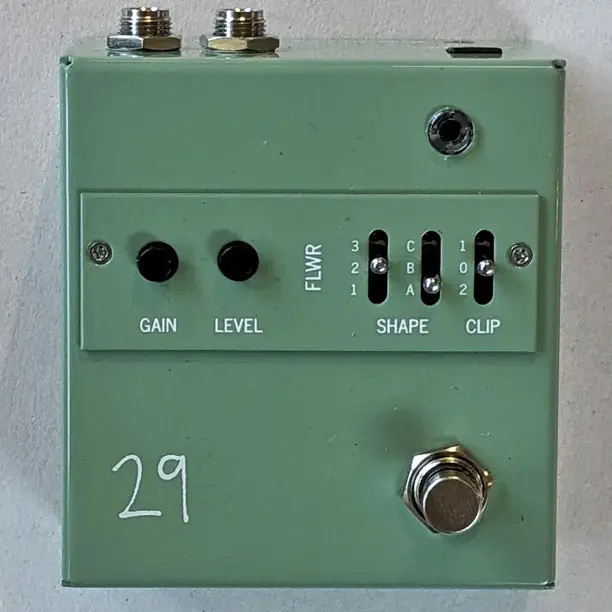
The 29 Pedals FLWR is the first “almost normal” pedal (in this case, a dirt box) by a Californian company whose previous products walked the line between utility boxes and signal conditioners. The “almost” in the previous sentence is due to the pedal’s semi-modular nature.
Like many modern gain pedals, FLWR was created to deliver a wide range of clean and saturated tones. It was carefully designed to help guitarists find the settings that best work for their ear, within a sonic range that goes from clean to edge of breakup to overdrive, distortion and even borderline fuzz when it’s all maxed out.
The set of controls is unusual, with only two knobs for Gain and Level, and three 3-way toggles, two of which are bundled under the Shape labels, and another one named Clip.
The two Shape controls set the character of the first gain stage, with 3 settings for overall gain (from 3 to 1: minimum gain, maximum gain, and darker maximum with low-pass filter) and 3 settings for tone and gain (bright medium gain, flat low-gain and scooped high-gain).
Needless to say, by mixing and matching these two controls you already get a total of 9 different tonal flavors just at this first gain stage.
The Gain knob sets the level of the second gain stage through a non-linear control: this means that the signal will get not just louder but also warmer the more you turn it up, helping tame highs at higher gain without losing clarity at lower gain.
We mentioned a semi-modular nature in the first sentence, and that is tied to the Clip toggle switch, whose diode array can be swapped with a difference PCB by removing the back cover – PCBs are available to make your own module. The stock diodes gives you two slightly different voicings (and a bypassed one at 0), but more drastic-sounding options can be installed.
Finally, the Level knob is an output that can deliver a monstrous 45dB of gain, and therefore drive any amp into breakup.
Have a listen to the 29 Pedals FLOWR in the videos below.
29 Pedals FLWR, Builder’s Notes
FLWR is an overdrive, distortion and sometimes fuzz! It starts very clean and gets up into Fuzz territory at max settings. It’s designed to help you find your own breakup point, so your playing can stay dynamic and full range and still breakup nicely when pushed. The SHAPE controls manage the first gain stage, you can check the quickstart guide and example settings for more info. GAIN controls the second gain stage, and the control is non-linear. As you add gain the response gets a little warmer, helping tame highs at higher gain without losing clarity at lower gain.
The clipping diode array is modular, pop off the back cover and you can swap out for a different array. PCBs are available to make your own module – if you happen to believe that some diodes are magical you are free to go on a side quest and track them down! FLWR ships with one module containing two array options. Select 1 or 2 on the CLIP control to engage them. The stock diode arrays are designed to be very subtle, but more extreme arrays are possible.
FLWR uses the same WHATEVER power supply featured on EUNA and OAMP – the pedal will accept 7.5 to 35 volts of AC or DC in either polarity with absolutely no change in tone or power to the circuit.






















